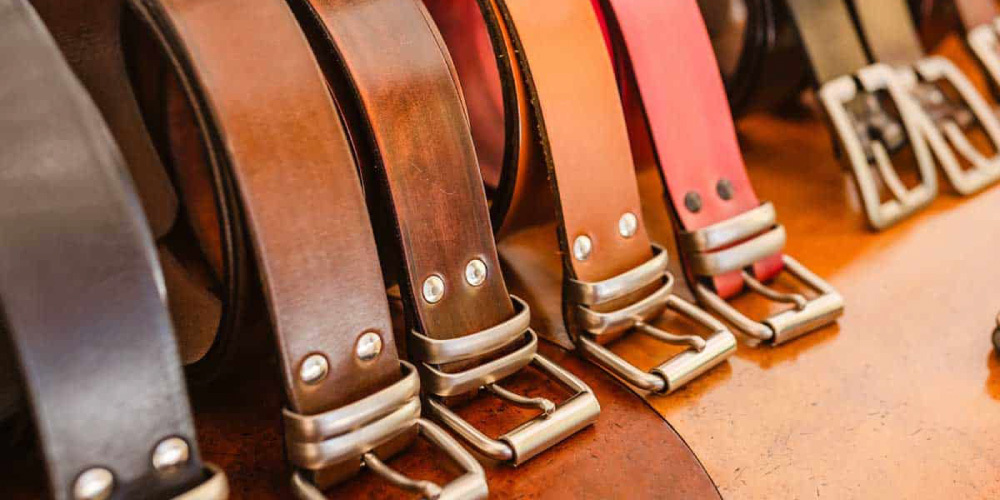Introduction
The majority of individuals go for leather belts, while some people like synthetic or nylon belts better. Read on for a description of each style of belt and details on why leather is still regarded as the finest material for belts if you're unsure about what to buy.
What are Leather Belts?
A long, structured belt made of leather is used to hold up pants, skirts, and other clothing on the body. Belts are among the first accessories in human history, and bronze-age buckle remnants have been discovered.
Because it can withstand being twisted, folded, and tightened without suffering any harm, leather is the preferred material for belts. Genuine leather belts have the extra benefit of moulding to the wearer over time, providing a really comfortable, tailored fit. Although they're sometimes disregarded, belts are a fantastic way to add individuality to any ensemble without going overboard!
To make your look even more sophisticated and stylish, you should be carrying high-quality genuine leather bags.
Types of Leather Belts
On the Basis of Leather
Cowhide Leather Belts
The majority of leather belts are manufactured from cowhide, also known as bovine leather, which is taken from the skin of cows or calves. Belts made of calfskin are more attractive and considerably softer.
Bison, goats, and pigs may also produce leather, however, kidskin is mostly used for gloves, but pigskin is very soft, flexible, and not frequently used for belts.
Suede Belts
Suede is a delicate leather created from an animal's underbelly that often has a napped texture. The term "suede" refers to the leather's finish rather than its source; you may get suede from deer, pigskin, or even lambskin.
Suede belts should only be used occasionally for smart-casual attire since they are easily destroyed and require particular maintenance. Due to the thinness of suede, suede belts frequently have a layer of regular leather underneath the suede.
Exotic Leather Belts
These leathers have a distinctive and striking texture, either in the form of feather pockmarks or reptile scales. These belts make a statement.
Some are -
- Crocodile
- Snake
- Ostrich
- Lizard
On the Basis of Leather
Full Grain Belts
Full-grain leather is the best kind of leather for belts. Full-grain leather has visible grain, hair patterns, and other natural marks since it is made from the complete, undamaged surface of the hide. The layer of the hide that produces this leather is the strongest and most precious, and it receives less processing.
Full-grain leather belts are often wide and sturdy and may have distinctive markings or branding from the cow's skin. Due to this, full-grain leather belts are frequently worn for informal occasions.
Corrected Grain Belts
The second-best leather quality for belts is corrected grain. Buffing removes the flaws (distinctive marks) of full-grain leather to create corrected-grain leather, which is smooth. After that, the leather is polished and coloured.
This leather quality is used to make pricey, formal belts, which are worthwhile purchases for your outfit.
Bonded Belts
This leather, which is also known as leather fibre or reconstituted leather, is not created from rawhide but rather from layers of discarded leather pieces that have been bonded or glued together. Then, this cloth is either coated with a thin coating of top-grain leather or treated and printed to seem like high-quality leather.
Unfortunately, as long as the belt contains no fabric or synthetic material, bonded leather can still be marketed as "genuine leather." Any belt made of bonded leather will not survive very long because it is an inexpensive, low-quality leather. Bonded leather belts, on the other hand, are significantly less expensive and suited as one-season accessories rather than wardrobe investments.
Split Leather Belt
Split leather, which is significantly less expensive but of lower quality, is the third degree of leather quality. Although it is much weaker, this leather is frequently polished and embossed to resemble top-grain leather.
Synthetic Belt
The term "synthetic" denotes that these belts are composed of a synthetic material rather than genuine leather.
This fabric, which is also known as "fake leather" and "vegan leather," is typically used to provide the appearance of leather rather than to trick the consumer into believing it is leather.
Although significantly less expensive than real leather belts, synthetic leather belts are substantially less robust.
How long does it take a leather belt to break in?
Given that leather is a natural material, breaking it in will take some time. This is especially true if you've never worn your leather belt before and are doing so now. We would advise you to continue breaking in your new belt if you have never worn any type of leather clothing. You may do this by wearing it every day and moving about in it until it feels cosy enough to wear it every day.
Due to the superior materials used in their construction, more expensive belts may take significantly longer to produce than cheaper ones (like suede). It also relies on the kind of material that was utilised to create these items! Before choosing which one is ideal for YOU, watch out for internet evaluations since some individuals like softer straps while others prefer firmer ones.
Some of the best quality and stylish-looking belts are the Valencia belt, Cieza belt and Palma belt by Salamanca Leathers. They have many more designs and colour options available in premium-quality leather.













